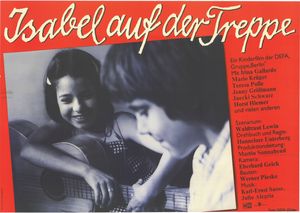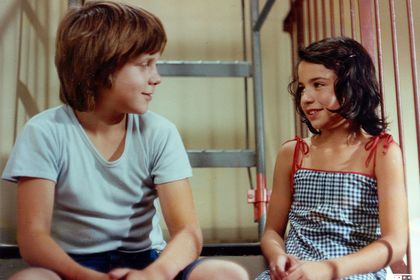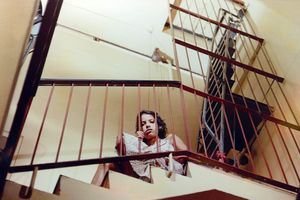Isabel auf der Treppe
Director: Hannelore Unterberg (geb. Neupert), 67 Min., Color, Feature Film
Deutsche Demokratische Republik (DDR)
DEFA-Studio für Spielfilme, 1983
- Film/Video Format
- 35 mm
- Length in m
- 1876
- English Title
- Isabel on the Stairs
- Premiere Date
- Release Date (for Cinema)
- Literary Source
- Lewin, Waldtraut: "Isabel auf der Treppe", Hörspiel

(Dir.: Hannelore Unterberg, 1983) Graphic Design: Klaus Zähler
Short Summary (English)
Many years ago, Isabel and her Chilean mother, fleeing the Pinochet regime, came to Germany. Because of Isabel's parents' active support of president Allende, they had to fear for their lives once Allende's government was toppled. While her father remained in Chile, Isabel and her mother not only found domicile in Germany, but also sympathy and understanding for their complicated situation. The Kunze family took over the sponsorship for the two refugees. The now twelve-year-old Isabel quickly made friends with Philipp Kunze and with the children in her school. Along with the Kunze family, Isabel and her mother stayed in dose contact with the community of Chilean refugees. It wasn't social problems that distressed the girl and her mother, but rather the constant worry concerning Isabel's father's well-being. Also Isabel's attempts to encourage her mother to sing again (her mother was an famous folk singer in Chile) didn't help the worries stayed. Sensing Isabel's increasing sadness, Philipp took special care of his friend. And through Philipp's help, Isabel was enabled to give her mother more encouragement. However, when the terrible news of her father's death come, her mother has a complete breakdown - but Isabel finds warmth and security with the Kunze family.
Source: Progress Film-Verleih

(Dir.: Hannelore Unterberg, 1983) Photography: Dieter Jaeger, Günther Sahr, Klaus Zähler

(Dir.: Hannelore Unterberg, 1983) Photography: Dieter Jaeger, Günther Sahr, Klaus Zähler
Film Crew
- Director
- Scenario
-
- Waldtraud Lewin
- Camera
-
- Eberhard Geick
- Film Editing
-
- Helga Krause
- Cast
-
- Irina Gallardo (Isabel)
- Mario Krüger (Philipp)
- Teresa Polle (Rosita Perez)
- Jenny Gröllmann (Margot Kunze)
- Jaecki Schwarz (Dieter Kunze)
- Horst Hiemer (Opa Kunze)
- Sandra Lill (Sandra Kunze)
- Benjamin Mihan (Max Kunze)
- Ruth Kommerell (Frau Flickenschild)
- Javiehra Peualba (Isabel 1977)
- Mirco Schmidt (Philipp 1977)
- Nancy Steinbrink (Sandra 1977)
- Paul Schimanski (Mann mit schwarzen Capa / Pinochet)
- Miriam Lewin (Fräulein Bredin)
- Gert Klisch (Hausmeister)
- Harald Arnold (Köhlert)
- Barbara Dittus (Stellvertretende Direktorin)
- Eva Schäfer (Frau Schreiber)
- Ilse Bastubbe (Frau Kästner)
- Rolf Staude (Dr. Ackermann)
- Ilse Voigt (Oma Soickert)
- Wolfgang Kühne (Hammer)
- Eva-Maria Fastenau (Fräulein Beisert)
- Eberhardt Wintzen (Koch)
- Hans Feldner (Meier)
- Mathias Luther (Junghans)
- Angelica Gonzales (Lilli)
- Julio Alegria (Orlando)
- Pablo Baytelman (Carlos)
- Wilson Araya (Luis)
- Fernando Gallardo (Rodrigo)
- Luis Carvajal (Antonio)
- Hermann Del Canto (Marcello)
- Tino Günter (Clemens)
- Miriam Knabe (Bianka)
- Assistant Director
-
- Mathias Luther
- Production Design
-
- Werner Pieske
- Script Editing
-
- Anne Pfeuffer
- Music
-
- Karl-Ernst Sasse
- Julio Alegria
- Sound
-
- Bernd-Dieter Hennig
- Gerhard Ribbeck (Tonmischung)
- Costume Design
-
- Isolde Warscycek
- Ingeborg Pfenniger
- Make-Up
-
- Karin Menzel
- Props
-
- Peter Röh
- Production Management
-
- Martin Sonnabend
- Unit Production Management
-
- Paul Schimanski
- Bernd Hunold
- DEFA Photography
-
- Günter Sahr
- Klaus Zähler
- Dieter Jaeger
Awards
- 4. Nationales Festival "Goldener Spatz" für Kinderfilme der DDR in Kino und Fernsehen Gera (1985): Preis der Jury des Jungen Publikums in der Kategorie Spielfilm
Short Summary (German)
Rosita Perez und ihre zwölfjährige Tochter Isabel leben seit sechs Jahren in der DDR. Sie sind Emigranten aus Chile. Als sie kamen, hatten die Nachbarn Margot und Dieter Kunze die Patenschaft übernommen, doch die ist im Alltag längst eingeschlafen. Rosita hat Arbeit, auch Kontakt zu anderen Emigranten, aber sie fühlt sich einsam, ist bedrückt. Isabel sitzt oft auf der Treppe, aus Angst, der Briefträger könnte eine Todesnachricht vom Vater aus Chile bringen. Diese würde sie der Mutter nicht geben, um deren Kummer nicht noch zu vergrößern. Philipp, Sohn der Kunzes und mit Isabel befreundet, merkt, dass die beiden Probleme haben und Zuwendung brauchen. Als die Nachricht vom Tod des Vaters tatsächlich eintrifft und Rosita zusammenbricht, findet Isabel bei Philipp und seinen Eltern liebevolle Aufnahme.
(Quelle: Das zweite Leben der Filmstadt Babelsberg. DEFA-Spielfilme 1946-1992)
Short Summary (Other Languages)
Sono sei anni, ormai, che Rosita Perez e sua figlia Isabel, emigrate cilene, vivono nella RDT. Inizialmente accolte dai vicini Margot e Dieter Kunze, oggi si sentono sole e depresse. Spesso Isabel resta seduta sulla scala, per paura che il postino recapiti la notizia della morte del padre. Se così fosse, non la consegnerebbe mai a sua madre, per non aumentarle il dolore. Philipp, figlio dei Kunze e amico di Isabel, si accorge dei loro problemi e del loro bisogno di attenzioni. Quando dal Cile apprendono della morte del padre e Rosita crolla dal dolore, Isabel trova accoglienza da Philipp e i suoi genitori. (Italienisch)



